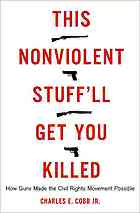
This nonviolent stuff'll get you killed : how guns made the civil rights movement possible PDF
02014·1.615 MB·English
Most books are stored in the elastic cloud where traffic is expensive. For this reason, we have a limit on daily download.
Preview This nonviolent stuff'll get you killed : how guns made the civil rights movement possible
Description:
"Visiting Martin Luther King, Jr. at the peak of the civil rights movement, the journalist William Worthy almost sat on a loaded pistol. "Just for self-defense," King assured him. One of King's advisors remembered the reverend's home as "an arsenal." Like King, many nonviolent activists embraced their constitutional right to self-protection-yet this crucial dimension of the civil rights struggle has been long ignored. In This Nonviolent Stuff'll Get You Killed, civil rights scholar Charles E. Cobb, Jr. reveals how nonviolent activists and their allies kept the civil rights movement alive by bearing-and, when necessary, using-firearms. Whether patrolling their neighborhoods, garrisoning their homes, or firing back at attackers, these men and women were crucial to the movement's success, as were the weapons they carried. Drawing on his firsthand experiences in the Southern Freedom Movement and interviews with fellow participants, Cobb offers a controversial examination of the vital role guns have played in securing American liberties. "--Publisher information."Visiting the parsonage of Martin Luther King, Jr. during the peak of the civil rights movement, the journalist William Worthy began to ease himself into an armchair, only to stop short. Sitting on the cushion was a loaded pistol. "Just for self-defense," King assured Worthy. It was not the only weapon that King kept for such a purpose; Glenn Smiley, a southern minister who advised King on the techniques of nonviolence during the Montgomery bus boycott, remembered King's home as "an arsenal." Living under constant death threats, King enlisted armed supporters to guard his home and family, and even applied for a conceal-and-carry permit. His application was denied--but it, like the rest of the evidence about King's gun ownership, points to a side of the civil rights movement that has long been ignored by history. In This Nonviolent Stuff'll Get You Killed, award-winning civil rights scholar Charles E. Cobb, Jr. reveals the fundamental but long-overlooked role that armed self-defense played in the golden era of the civil rights movement"-- Read more... Abstract: "Visiting Martin Luther King, Jr. at the peak of the civil rights movement, the journalist William Worthy almost sat on a loaded pistol. "Just for self-defense," King assured him. One of King's advisors remembered the reverend's home as "an arsenal." Like King, many nonviolent activists embraced their constitutional right to self-protection-yet this crucial dimension of the civil rights struggle has been long ignored. In This Nonviolent Stuff'll Get You Killed, civil rights scholar Charles E. Cobb, Jr. reveals how nonviolent activists and their allies kept the civil rights movement alive by bearing-and, when necessary, using-firearms. Whether patrolling their neighborhoods, garrisoning their homes, or firing back at attackers, these men and women were crucial to the movement's success, as were the weapons they carried. Drawing on his firsthand experiences in the Southern Freedom Movement and interviews with fellow participants, Cobb offers a controversial examination of the vital role guns have played in securing American liberties. "--Publisher information."Visiting the parsonage of Martin Luther King, Jr. during the peak of the civil rights movement, the journalist William Worthy began to ease himself into an armchair, only to stop short. Sitting on the cushion was a loaded pistol. "Just for self-defense," King assured Worthy. It was not the only weapon that King kept for such a purpose; Glenn Smiley, a southern minister who advised King on the techniques of nonviolence during the Montgomery bus boycott, remembered King's home as "an arsenal." Living under constant death threats, King enlisted armed supporters to guard his home and family, and even applied for a conceal-and-carry permit. His application was denied--but it, like the rest of the evidence about King's gun ownership, points to a side of the civil rights movement that has long been ignored by history. In This Nonviolent Stuff'll Get You Killed, award-winning civil rights scholar Charles E. Cobb, Jr. reveals the fundamental but long-overlooked role that armed self-defense played in the golden era of the civil rights movement"
See more
The list of books you might like
Most books are stored in the elastic cloud where traffic is expensive. For this reason, we have a limit on daily download.
